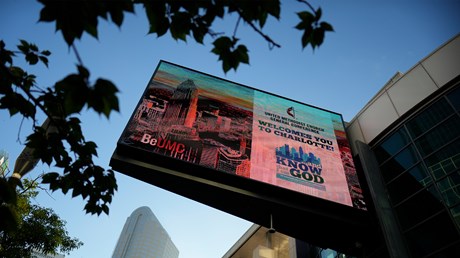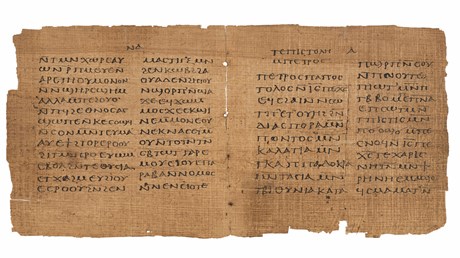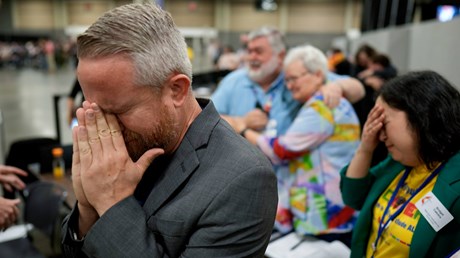|
After this week’s UMC votes on LGBTQ issues, African Methodists should join American conservatives in the new Global Methodist denomination.  That was fast. In the first General Conference since the most conservative congregations disaffiliated, the United Methodist Church liberalized its teachings on marriage, sexuality, and the ordination of LGBTQ clergy. In other mainline denominations, like the Evangelical Lutheran Church in America and the Presbyterian Church (USA), the conservative exodus has tended to come after the progressive victory. But in the UMC, the conservative American contingent is already gone, so the vote wasn’t close. With that settled, the next and perhaps final battle between American Methodists who have been on opposite sides of theological and social issues for more than half a century will concern who can win over the Africans, who have been the “main group opposing the changes in policy” on sexuality and are also the largest UMC contingent outside the United States. The breakaway conservative denomination called itself the Global Methodist Church in no small part because members hoped to remain in fellowship with churches in the Global South, where Methodism is more orthodox—and growing as Methodism in the US hasn’t in years. But the United Methodist Church has also set in motion a plan to allow regional autonomy on the very issues that broke up the denomination domestically. This would permit African churches to remain traditional in how they define marriage and—so the pitch goes—otherwise insulate themselves from the Americans’ liberal course. African Methodists have previously rejected similar proposals, likely understanding how such rules would dilute African churches’ influence over the denomination and exempt leaders of the shrinking US church from accountability ... Victim says she wants accountability more than money.  Hillsong Church Australia’s legal settlement with a former student who was groped by a worship leader fell apart on Thursday when the survivor refused to sign a non-disclosure agreement. “I will not give up my voice,” Anna Crenshaw, daughter of Pennsylvania megachurch pastor Ed Crenshaw, told Australian reporters. “This has never been about money for me but about justice and accountability.” According to lawyers, one condition of the agreement was a joint statement saying the church reported the assault immediately. Crenshaw claims Hillsong—embroiled at the time in a scandal over founder Brian Houston’s failure to report his father Frank’s sexual abuse of a young boy—actually waited four or five months to contact police. Crenshaw was studying at Hillsong College in 2016 when Jason Mays, an administrative staff member and volunteer worship leader, put his hand on her inner thigh. The young woman—18 at the time—got up to leave, but Mays, 24, grabbed her, wrapped his arms around her waist, and touched her legs, butt, and crotch, according to a statement Crenshaw wrote several years later. “He lifted up my shirt and was kissing my stomach,” Crenshaw, now 26, said in a TV news interview. “So I’m just, like, stuck there with this guy groping me.” Crenshaw did not immediately report the incident because, she said, she was ashamed. She also didn’t believe she could report Mays to human resources, because the department was run by Mays’s father. Two years later, a counselor pushed her to report to someone, and Crenshaw went to the head of pastoral care, who said, “I’m sure he’s really sorry,” according to ... An ancient codex, containing perhaps the earliest complete versions of Jonah and 1 Peter, goes up for auction in June. Will it disappear?  One of the oldest books in existence, which contains what is perhaps the oldest complete versions of Jonah and 1 Peter, is going up for auction in June. The sale of the Crosby-Schøyen Codex has scholars excited to talk about its uniqueness—and nervous about whether it could go into private hands and disappear. The Crosby-Schøyen Codex is a primary example of the invention of books, which coincided with the spread of Christianity, said Eugenio Donadoni, a specialist in books and manuscripts at Christie’s London, which is auctioning the codex. The growth of Christianity spurred the need to “maximize the text you can write down and transmit … around the Mediterranean,” Donadoni said. Before codices appeared in roughly the third century, scrolls “for several thousand years were the primary vehicle for transmitting literature,” said Brent Nongbri, an expert in early Christian manuscripts and a professor at the Norwegian School of Theology. Codices were a technological advancement that “that wouldn’t be surpassed until the discovery of the printing press,” Donadoni added. Donadoni just finished touring the codex for potential buyers in New York and Paris before returning it to London, where it will be auctioned on June 11. About the codex he said, “I’ve never seen anything like this.” A single scribe wrote out the texts of the codex on papyrus leaves in Sahidic Coptic somewhere between A.D. 250 and 350, according to carbon dating of the codex conducted in 2020. That means it’s likely the text was written before the late-fourth-century councils, when the canon of Scripture began to be established. “This is being used at a time when ... The widespread outrage over Kristi Noem’s book should awaken moral responsibility—not just toward pets but for one another.  This piece was adapted from Russell Moore’s newsletter. Subscribe here. Decades ago, before he was a nationally recognized face, Stephen Colbert featured a “Better Know a District” segment on his show The Colbert Report in which he would parody a far-right cable news host as he interviewed members of Congress, trying to get them in awkward situations for comedic effect. In his interview with John Yarmuth, then a congressman from Louisville, Kentucky, Colbert referenced Yarmuth’s past life as a debater on local television. He challenged Yarmuth to show his debating chops by instantly debating the opposite side of a question of Colbert’s choosing. The stance Colbert chose to take was that throwing kittens into a wood chipper was a bad thing to do—and he then pointed to Yarmuth to argue the other side—that sometimes, throwing kittens in a wood chipper is the right thing to do. The joke, of course, was that no decent human being, much less a politician seeking votes from a majority of the population, would ever want to be seen making the case for throwing kittens in a wood chipper. This past week, South Dakota Gov. Kristi Noem proved that, as much as the American public has shifted on all kinds of issues, there still isn’t much of a constituency in this country for “Throw Kittens in the Wood Chipper”—or, more accurately in this case, “Shoot Puppies in the Head.” In fact, many people have noted that this might be the most united that Americans of both parties and all tribes have been of late—all in expressing revulsion at Noem’s self-disclosure in her memoir that she “hated” her 14-month-old dog Cricket. When Cricket wasn’t ... Migrant rights have been off-radar for many Panamanian Christians. But as pressures increase, some are speaking out ahead of this weekend’s general elections.  On May 5, Panamanians will vote for a new president. The outcome of this election may have consequences for far more than its 4.4 million residents; it could change the migration reality for the hundreds of thousands of people traveling from South America, Asia, and Africa who pass through the Central American country en route to the United States. Leading in the polls is José Raúl Mulino, a candidate for Realizando Metas (Realizing Goals), a right-wing populist party founded by disgraced president Ricardo Martinelli. He has vowed to shut down the Darién Gap, a densely forested jungle area that migrants must traverse to enter Panama from the bordering country of Colombia. “We’re going to close Darién and we’re going to repatriate every one of these people, respecting their human rights,” said Raúl Mulino in April. For many Panamanians, there was no migrant crisis before 2022. After passing through the Darién gap, migrants passed through the country on government buses to the Costa Rican border. But after a shift in US migrant policy sent many back to Central America a couple years ago, hundreds have since moved to Panama City and a handful of small towns. Residents have begun to blame them for crime and for overwhelming their sanitation systems. Though evangelicals have largely been on the sidelines, many leaders say they should have done more. “The church does not see the refugee problem as their own problem,” said Panamanian missionary Robert Bruneau, a regional leader with United World Mission. “They believe it is something the state should do and are not aware of the great opportunity they have to graciously and honorably serve someone who ... Ethan Hawke has made a movie as scandalous as one of the writer’s short stories.  Why not write something that “a lot, a lot, of people like?” Regina O’Connor asks her daughter, the writer Flannery O’Connor, in the middle of the new biopic Wildcat. The same question might be put to the film itself. It’s not a movie that a lot of people will like. But unlike the author’s mother, I mean that as a high compliment. Director and screenwriter Ethan Hawke has made a film worthy of Flannery O’Connor’s genius. An epigraph from O’Connor’s essay “The Nature and Aim of Fiction” sums up what Wildcat sets out to do: “I’m always irritated by people who imply writing fiction is an escape from reality. It is a plunge into reality.” Fittingly, rather than depict the writer’s life from birth to death, Wildcat uses her fiction to discover what’s real, to “get down under things” to the problem of suffering, the limitations of human experience, the desire for goodness, the habits of evil, and, always present, the longing for God. The result is a movie as scandalous as one of O’Connor’s short stories—“shocking to the system,” to borrow her words. Her devotees will applaud it; most of the audience will be left wondering what just clobbered them. After that opening epigraph, Wildcat rolls a fake trailer for a 1950s-style horror flick inspired by O’Connor’s story “The Comforts of Home.” (A mother brings home a wayward, orphaned teen who tries to seduce her grown son. The son attempts to kill the teen, but shoots his own mother instead.) The trailer, starring Laura Linney and Maya Hawke—who also play the roles of Regina and Flannery— sets up expectations ... Why the church has struggled to address mental illness well and how we can care better.  Nearly five years ago, a high-profile pastor—one who had shared bravely and publicly about his battle with depression—took his own life. In the days after his death, a call circulated widely on social media platforms for clergy with mental health issues to be removed from their posts. I understand the motivation. The argument was made out of a concern to prevent similar tragedies. But as a pastor who has endured chronic mental torment, the simplistic appeal struck me as an example of the widespread clumsiness within the church when it comes to addressing mental illness. Prominent Christian teachers, most recently including California author and pastor John MacArthur, have denied diagnosable conditions such as OCD and ADHD even exist. In my own ministry, my struggles with anxiety and OCD have proven to be unexpectedly fertile soil for connecting with people. Opening up about the brokenness in my mind has led to deeper relationships as God took the affliction that initially felt to me like pure deficit and put it to work. His strength, as he tells us, shows up in our weakness (2 Cor. 12:9). So I find it heartening to see the increased attention to mental health and compassion for mental illness in our culture. Christian resources addressing the intersection of faith and mental illness are also proliferating, providing theologically grounded pathways to better care. And there are countless examples of congregations powerfully demonstrating the love of Christ to those in mental anguish. Still, the stigma accompanying mental illness persists, and in church settings, the issue is often complicated further by ignorance or misguided theology. Clergy tend to be the “first responders” ... After years of disagreement and the departure of thousands of churches, the change passed without debate.  United Methodists meeting for their top legislative assembly Wednesday overwhelmingly overturned a measure that barred gay clergy from ordination in the denomination, a historic step for the nation’s second-largest Protestant body. With a simple vote call and without debate, delegates to the General Conference removed the ban on the ordination of “self-avowed practicing homosexuals”—a prohibition that dates to 1984. With that vote, the worldwide denomination of some 11 million members joins the majority of liberal Protestant denominations such as the Episcopal Church, the Presbyterian Church (USA), the Evangelical Lutheran Church in America, and the United Church of Christ, which also ordain LGBTQ clergy. “We’ve singled out one group for discrimination for 52 years,” said Ken Carter, bishop of the Western North Carolina Conference. “And we’ve done that on an understanding of homosexuality whose origins came when it was understood to be a disease and a disorder.” That, he said, has now changed. “Increasingly,” he said, “people see that God’s spirit is in gay and lesbian people.” The morning vote on the motion was part of a larger series of calendar items voted on in bulk. They also included a motion barring superintendents, or overseers, from punishing clergy for performing a same-sex wedding or prohibiting a church from holding a same-sex wedding, though the actual ban on same-sex weddings in churches has yet to be voted on. The vote on the calendar items was 692–51, or about 93 percent in favor. After the vote, LGBTQ delegates and their allies gathered on the floor of the Charlotte Convention Center to sing, hug, cheer, and shed tears. ... A professor explains why examining a school’s doctrinal statement isn’t enough.  When I speak at churches around the country, the conversation after my talks often turns to the state of Christian higher education. I’m a professor at a Christian institution, and Christian parents and grandparents want to know where high school graduates can go to have their faith deepened rather than undermined. These concerns have only become more pressing given the ongoing rise in young people wandering away from the church and describing their religious convictions as “nothing in particular.” The question many Christians have for me is which colleges are “safe” or “real” Christian schools, which usually means those that have a truly conservative theological ethos. For those who aren’t familiar with the world of Christian higher ed, it can be difficult to identify these schools from outside the campus community, and parents often (reasonably) conclude an institution’s stance on human sexuality is the simplest indicator of a college’s commitment to Christian orthodoxy. LGBTQ questions are indeed important, and they can serve as a proxy for an institution’s broader theology. But by itself, this isn’t a reliable formula for finding a good Christian college. A school may stake out a bold position on sexuality and yet capitulate to what I’d suggest is the most overlooked and therefore most insidious threat to Christian education in America right now. It’s not progressive theology. It’s a pervasive consumerist anthropology. Theological anthropology concerns our assumptions about the nature and purpose of humanity. And by “consumerist anthropology” I mean the belief—often subconsciously held—that ... Every sin requires Christ’s atonement. But the Bible shows God punishing—and repairing—different sins differently.  Christian theology consistently holds together truths that seem to want to fall apart: Jesus is fully God and fully human. People are sinners and created in the image of God. The church is local and universal. And yet, despite what we affirm, in practice, Christians are often unable to walk and chew gum at the same time. Instead of holding two truths in tension, we tend to slide to one side or the other, distorting it in the process. We treat Jesus either as an invulnerable, transcendent being or as a mere prophet. We speak as if humans are either so degraded we are capable of nothing but sin or mostly fine with a few rough edges. We think of the church as if it were only our own sect or we minimize the local congregation. Evangelical theologians have done great work in Christology, anthropology, and ecclesiology, respectively, to retrieve those three truthful tensions. But there is a fourth tension yet to be retrieved: All sins ruin us, and yet not all sins ruin us equally. To start, let us be clear: Sin—however small—is a serious thing. And sin is only atoned for by the work of God in Jesus Christ. But saying that Christ is the only one who atones for all sin is different from saying that all sins do the same kind of work on us. All sins break the sinner and create havoc around us. And yet the Scriptures consistently depict the sins we do as different, not only in effect on one another but before God. Within the Law, for example, different social remedies are given for different sins, and so are different sacrifices (Lev. 4; Ex. 21). Not everything requires a bull or a goat. Sometimes a dove will do. In the Prophets and Proverbs, God distinguishes—and even prioritizes—certain ... |
Site Mailing List
A Family Church for the "Whole" Family Christ View Church Copyright 2004 © Christ View Church. All Rights Reserved. Powered by Sitebuilder
|






